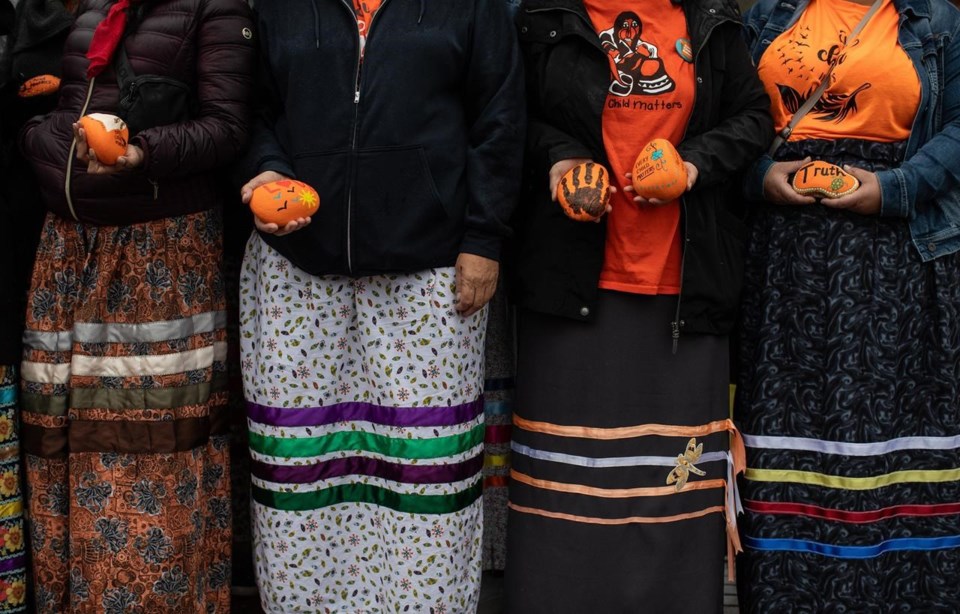CALGARY — The lawyer for a residential school survivor leading a proposed class-action defamation lawsuit against the Catholic Church over residential schools says the court action is a last resort.
Maxime Faille, the lawyer for Sphenia Jones, says the goal is understanding — not money.
"Sphenia is 80 years-old. She doesn't care about money for herself,” Faille said in an interview from 91Ô´´.
“She wants to see healing happen, and this is an opportunity for healing and reconciliation.
“But it takes two willing partners to do that. To me, (the lawsuit) is the fall back if the other side isn't willing to come to the table."
Jones is a Haida elder who spent time at the Edmonton Indian Residential School.
She filed a statement of claim last year alleging Rev. Marcin Mironiuk made defamatory comments during a 2021 sermon at Our Lady Queen of Poland Parish in Edmonton by describing evidence of unmarked graves as "lies" and "manipulation."
The lawsuit argues that the comments target residential school survivors who have spoken publicly about the deaths associated with residential schools, including the discovery of gravesites at the Kamloops Indian Residential School grounds.
"This is the very group at which the defamatory statements were directed, labelling them as liars and manipulators in an attempt to discredit them,” says the lawsuit.
“The defamatory statements referred to, and would be understood to refer to, each member of the group," it says.
The allegations have not been tested in court.
The lawsuit names Mironiuk, the Catholic Archdiocese of Edmonton and the Oblate Fathers of Assumption Province as defendants.
The Edmonton Archdiocese declined to comment, citing the matter is before the courts.
The Oblate Fathers, in a statement last week, said they are contesting the lawsuit. They said Mironiuk did not intend to cause harm or dismiss the “hurtful reality” for some who attended residential schools.
“Father Mironiuk personally pledged further to advance truth and reconciliation with Indigenous 91Ô´´s and had educated himself about the issue even further,” read the statement.
Mironiuk, who is now in Ontario, is listed as an associate pastor at St. Eugene De Mazenod Mission in Brampton. The mission did not respond to a request to confirm he is still there.
Faille said his client has been very vocal about her experience at the residential school, including witnessing death and the burials of classmates.
He said residential school denialism appears to be on the rise and the priest's comments were hurtful.
"Those comments, they weren't directed at anyone in particular, but they were directed at those people who are saying the truth about what happened,” he said.
"It's not a good feeling to be branded a liar in the public sphere."
Faille said the idea of a group defamation lawsuit is unusual and challenging, but there's law supporting it.
The lawsuit obtained a victory in Calgary court earlier this week when a judge ruled it can move forward. Lawyers representing the Archdiocese and the religious order had asked for it to be struck down.
Law professor Tony Paisana said the class action is straightforward.
"It's unusual in the sense that these people don't know each other and one has never interacted with the other. But that's more a function of what the tort is than anything else," said Paisana, an adjunct law professor at the University of British Columbia.
Paisana said in defamation cases, an individual can be sued for saying something even though they don't know the people who are alleged to have been affected.
"It's not as if it's a class action for battery or sexual assault. It's something you can do in the context that you don't know each other,” he said.
Faille said the next step is to get the class action certified in a hearing, which could take up to a year.
This report by The 91Ô´´ Press was first published April 27, 2024.
Bill Graveland, The 91Ô´´ Press


